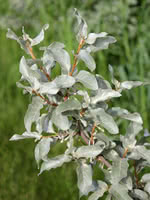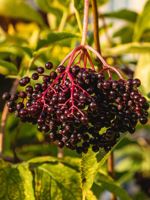Mon-Fri 9am - 5pm Mountain time
Silverberry (Wolf Willow) vs Bob Gordon Elderberry
Elaeagnus commutata
Sambucus canadensis Bob Gordon
Silverberry (also known as Wolf Willow) is a common native North American shrub. This beautiful ornamental plant has characteristic silver leaves and fragrant yellow flowers.
Its silver berries remain on the branches through the winter. Silverberry is cold hardy and has some ability as a nitrogen fixer. It can grow on dry to moist sandy/gravel soils. This plant is very low maintenance.
Bob Gordon Elderberry is a Black Elderberry cultivar that produces berries that are larger and sweeter than other varieties, making it one of the top cultivars. It produces large clusters of white flowers that turn into large clusters of dark purple to black berries. The berries are well-suited for baked goods, jams, jellies, and syrups. It was selected from the wild in Missouri.
The large berry clusters that the Bob Gordon Elderberry produces will often end up hanging downward. This makes it more difficult for birds to feed on the berries. If birds are a concern, this might be the right berry for you.
Black Elderberries are considered to be partially self-pollinating. So while they will still produce some berries without cross-pollination, planting with another variety will increase yields. Consider planting with Black Elderberry or Ranch Elderberry.
Warning: the seeds, stems, leaves, roots, and uncooked berries are toxic to humans when eaten in quantity. Berries should be cooked to make them safe for human consumption.
Silverberry (Wolf Willow) Quick Facts
Bob Gordon Elderberry Quick Facts
Toxicity: leaves, stems, and uncooked berries are poisonous to humans

